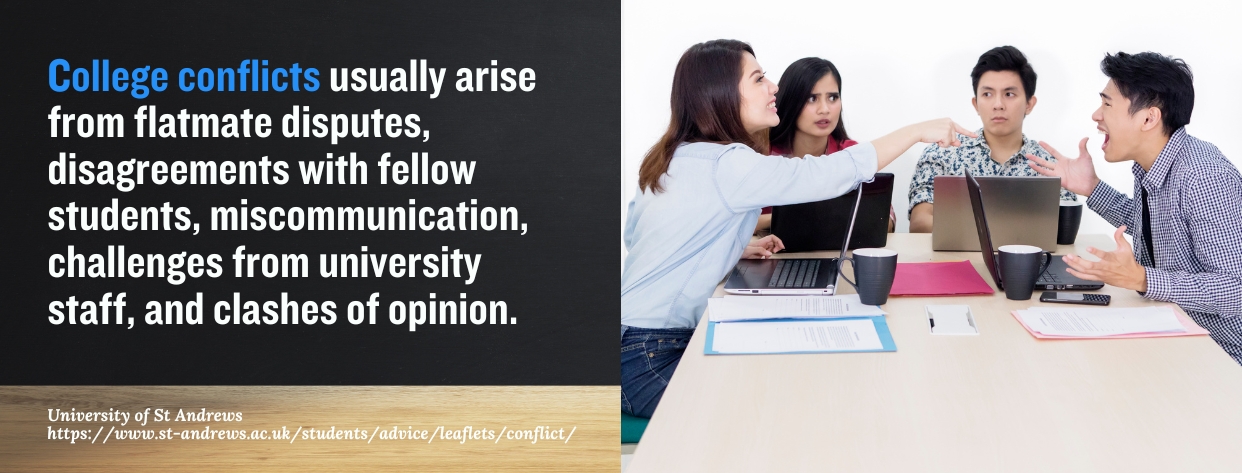Find Your Perfect School
College is both exciting and daunting to many prospective students. On the one hand, it offers a wealth of experiences waiting to be tapped. On the other, students are bound to face various challenges that can make or break their pursuit of higher education.
Are you looking for a quality public university? Check this out: The Best Public Universities Online
One of these challenges is the occurrence of conflicts. While conflicts are normal and generally unavoidable in any aspect of life, it cannot be denied that conflicts play a huge role in the lives of many college students. It is important that universities and colleges offer support and guidance to ensure students will be able to navigate difficult and often uncomfortable conflicts that they may encounter.
Of course, at the heart of resolving conflicts lie some foolproof conflict resolution strategies that will diffuse problematic situations. Resolving conflicts include active listening to come up with a mutual understanding and generating solutions while considering the different perspectives of the parties involved.
Common Conflicts Faced by College Students
College students face a variety of conflicts, sometimes even going beyond academic matters. It is important to know these common conflict styles to better help students deal with challenges that come their way. Classroom conflict dominates most students’ lives, but their problems also extend to their personal lives. It is not surprising to find many students overwhelmed with all the hurdles and distractions that college and its many demands entail.
Managing conflict is tough, but it is also a learning opportunity for those involved to brainstorm solutions, arrange facilitated dialogues, and encourage students to compromise. Students will be able to find a solution to their problems and even enhance their conflict resolution skills and communication skills in the process.
Recognizing the different conflicts faced by college students is an important step in finding a solution. Here are some of the most common conflicts most college students deal with.
Time Management
Time management is largely involved in coursework and other academic requirements. The main struggle for many college students is meeting deadlines and managing overwhelming school work. Depending on their degree program, they may find themselves cramming to complete the number of credits required to earn their undergraduate degree.
Low Motivation
Many students have a hard time keeping up the momentum, especially when they get past a few years in college. The lack of motivation makes it difficult for them to attain what they set out to do, often leaving them stressed about every little thing.
Too Many Distractions
Students find themselves overcoming many distractions that come their way. It has become too easy to get lost in the rabbit hole that is social media. Some students are engrossed with television, video games, and mobile phones. These distractions often impede their productivity.
Choosing a Major
It can be stressful for many college students to choose a major. They struggle to make the appropriate choice that can either positively or negatively impact their future.
Dealing with Relationships
Students usually seek to build relationships in college, whether it is a form of friendship bond or a romantic kind. All too often, this can interfere with their own goals of acquiring a degree, especially if they have to deal with occasional fights and the emotional ride that ensues.
Financial Difficulty
Many students face high tuition rates in college, which is a major impediment to their academic goals. Beyond the tuition, they must also think about the cost of transportation, accommodation, and other school fees like textbooks and miscellaneous pay. It is not surprising to find college students getting into debt because of student loans.
Check this out: Happiest Careers That Pay Well
10 Conflict Resolution Strategies to Help College Students
Like most things, conflict resolution is a process where all parties involved contribute and participate. Here are the following strategies that can be considered in order to best manage and resolve any conflict situations that may arise:
Active listening is key
There’s plain listening, and then there’s active listening. With active listening, you’re not just hearing the words that the other is saying, but you’re actively acknowledging what they are saying and grasping the meaning of their words. The goal of active listening is not to come up with a reply but to stay calm, hear out the other party, and gain an understanding of their side.
Get a neutral third party to help mediate
This may not always be possible, but a neutral third party is able to better hear all sides in a conflict without biases getting in the way. In the context of college, neutral third parties abound, such as one’s fellow students, professors, and other administrative staff, and there are many venues and mechanisms to facilitate dialogues and resolve conflicts.
A technical approach to resolving conflicts in college is what experts call restorative justice, wherein everyone is involved in a positive aftermath of the conflict. Mediation processes, conferences, and counseling involving the wronged and the offender are part of the solution.
Focus on getting a win-win solution
College is often a competitive environment, and in many situations, winning or getting one over your peers seems to be desirable. A competitive spirit, while being a good aid to excellence, can exacerbate conflicts.
The key to handling conflict on campus and resolving it is ensuring that no party feels like they got ripped off.
Always make it a goal to de-escalate
When one thinks of de-escalating tensions as one of the keys to resolving a conflict, one is able to better choose what to do next. Ask the question: “Will this make things better or worse?” Doing so can even prevent a potential conflict!
Always think of the bigger picture
It’s always helpful to momentarily step back from the situation and see it in relation to the bigger scheme of things. It can be that in a particular moment, what seems to be a disadvantage or a loss may not be as significant in the long run.
Keep your emotions in check
The following wise words come to mind: “What is done/said in anger is regretted at leisure,” and “True power is restraint.” Indeed, in the heat of the moment, it is easy to lash out and say the wrong words. Pause, breathe, and try not to be reactive. It takes great effort, but looking back, a lot of situations wouldn’t have gotten worse if one didn’t let their emotions get the better of themselves.
Look at things through multiple and/or alternative perspectives
This is a crucial step to gaining a better understanding of the other sides in a situation. A more familiar way of saying this is to put oneself in the other’s shoes and look at things from their point of view. This way, one gets to see any reasons, situations, or realities that are the basis of the points the other sides are arguing for, and this helps lead to a more managed solution.
Respect begets respect
Like in all things, respect is the most important foundation for good relations. Approach conflict resolution with respect in mind. In order for one to be listened to and acknowledged, one must also genuinely treat the other side as equals with their own points that deserve to be listened to.
Don’t be afraid of compromise
Give some away today, and gain in the future. Conflict resolution involves compromise. As said earlier, everyone must walk away without feeling like they’ve been short-changed. In order for this to happen, both sides must be ready to concede some points. This doesn’t come easy, though, and compromise is a necessary process that involves genuine participation from all parties.
Always reflect
Similar to what was said earlier, what is done in haste is repented at leisure. Especially in conflict situations, it is very important to constantly be able to look twice and second-guess oneself. After all, our ideas, which are the bases of our actions, may not necessarily be on solid footing, and it helps to keep asking these questions to keep oneself in check.
Focus on solutions
Getting caught up in placing blame (especially on others) is easy, but this is a superficial way of getting a win on others that gets everyone nowhere. It is always better to approach conflict resolution by looking for ways to generate solutions.
In Conclusion
Conflict resolution is a process that requires the active involvement of all parties involved.
What seems like easy ways out of conflict situations (playing the blame game, lashing out, etc.) in the end only makes things worse. Conflict resolution requires effort from everyone in terms of the right mindset, goals, and actions.
Additional Info: How To Organize a Peaceful Campus Protest



